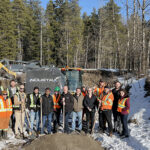Home »

Used fishing line being recycled and repurposed
As more and more people are taking up the sport of angling, there is growing need to protect the waterways to ensure these spaces will stay clean and beautiful for future generations to enjoy.
To help keep discarded gear out of streams and lakes, the Freshwater Fisheries Society of BC has partnered with Canada’s volunteer fishing-line recycling program, Clear Your Gear, to facilitate disposal and recycling of fishing line and promote environmental stewardship by freshwater anglers.
The society has received 30 fishing line receptacles, which have been placed at hatchery fishing ponds (including Kootenay Trout Hatchery), high-use urban lakes, high-traffic fishing areas, and popular fishing docks. The fishing recycling receptacles are manufactured by Clear Your Gear and their distinctive periscope shape makes them especially recognizable.
Most fishing line is made of monofilament, a synthetic fibre that is non-biodegradable and can remain in the environment for up to 600 years, depending on environment factors. This is longer than Styrofoam cups, plastic bottles and cigarette butts. Fishing line poses a particular risk for birds and animals, as it is often clear, making it hard to see. Birds and animals can easily ingest the line, or become entangled, leading to injury and death. Fishing line is the leading cause of entanglement issues for people, property and wildlife.
“We are very excited to partner with the Freshwater Fisheries Society of BC and expand this program through their networks and expand awareness of the importance of keeping fishing line out of the environment,” said Steve Loney, Community Relations, Clear Your Gear. “When people find out how long fishing line remains in the ecosystem and how much damage it can do, they are often surprised. It motivates them to find in a more environmental solution to used gear.”
Anglers are able to dispose of used monofilament and fluorocarbon line in the Clear Your Gear receptacles. Through the Clear Your Gear program, the fishing line is collected from recycling receptacles and cleaned of hooks, leaders, weights, and trash by volunteers. Line is shipped to the Berkley Pure Fishing company in Iowa where it is melted down into raw plastic pellets. The pellets can be made into other plastic products including various components for the automotive and foot wear industries. Fishing line is made of a high density plastic that requires a unique recycling process. It cannot be recycled through household recycling programs.
Fishing line that is braided or contains wire cannot be recycled and should be cut into short lengths and put into the trash.
Anglers can find a line recycling location by searching for receptacles by location or checking the map on the Clear Your Gear website for the nearest location. The map is updated regularly as new receptacles are installed.
“We have partnered with local organizations, municipalities and governments, utilizing local knowledge to place receptacles where they are the most beneficial to anglers. Maintenance of the receptacles and collection of the used fishing line will be shared by these partners and the society and we’ve placed them to ensure they are emptied regularly,” said Marleau Brown, Outreach Coordinator, Freshwater Fisheries Society of BC. “It’s another tool not only for anglers but for anyone who wants to leave our streams and lakes cleaner than they found them.”
The Freshwater Fisheries Society of BC was created in 2003 as a private, not-for-profit organization, funded mainly through freshwater fishing licence revenues. In partnership with the province, the Society annually stocks six million trout, char and kokanee salmon in 800 B.C. lakes. It also manages special hatchery programs for endangered species including white sturgeon, conducts fisheries research, education and conservation programs, and works to make angling more accessible for all.
To find out more, visit gofishbc.com.
Freshwater Fisheries Society of BC







